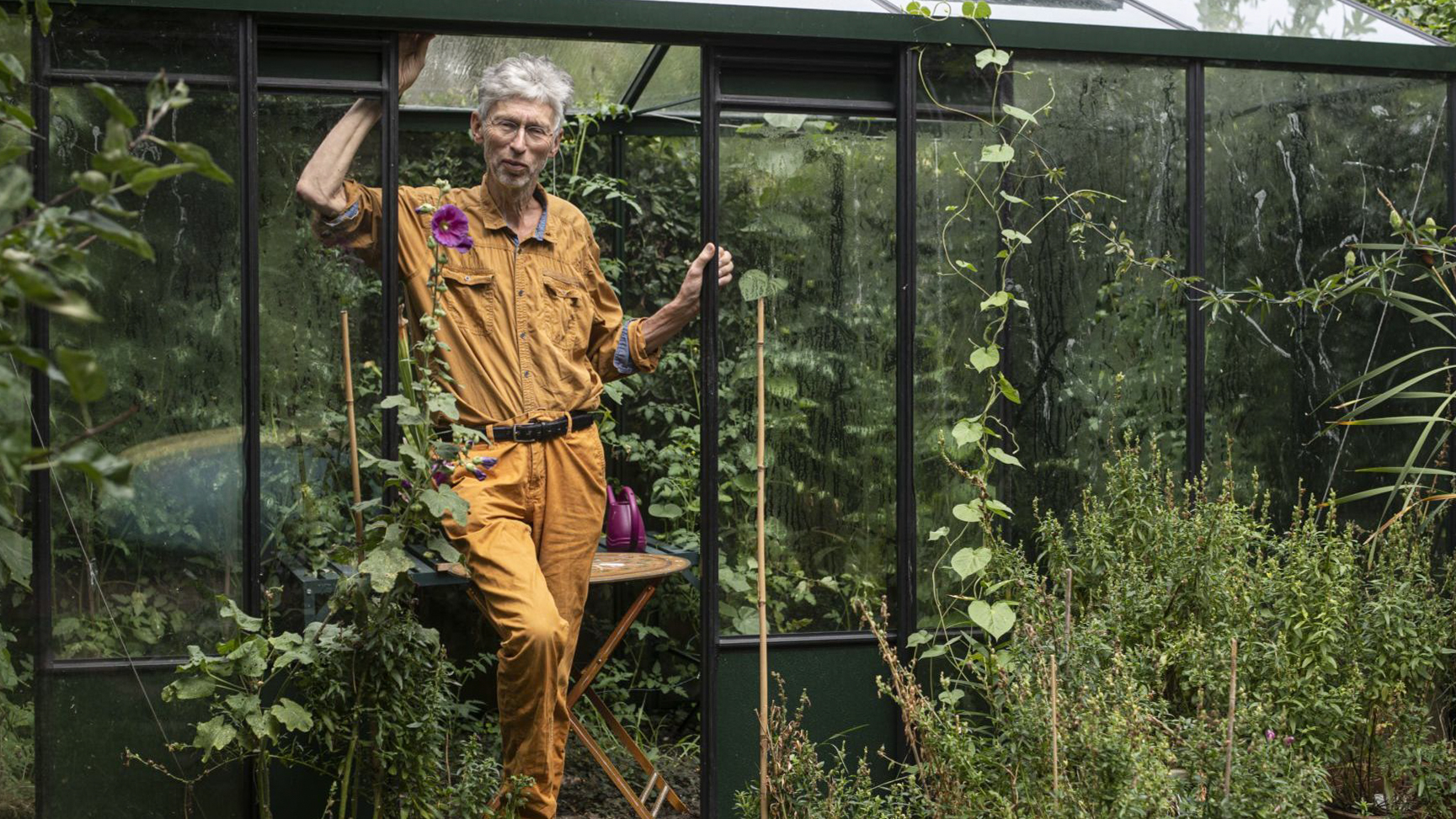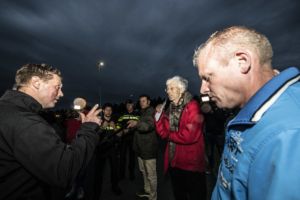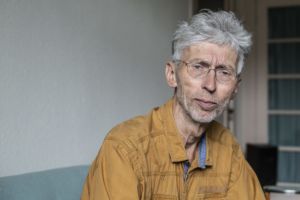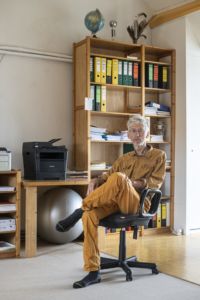Summer interview (2): Johan Vollenbroek – nature’s pitbull
-
 Johan Vollenbroek. Photo by Paul Rapp.
Johan Vollenbroek. Photo by Paul Rapp.
Johan Vollenbroek is both famous and notorious for his persistent fight for a stricter nitrogen policy. The chemist advocates for nature, because nature does not have a voice of its own. Back in his student days, he was a trainer at the athletics association ’t Haasje, where he already argued that meat was in no way necessary for a top athletic performance.
Summer interviews
This is the second episode of a series of summer interviews. The articles also appeared in Vox magazine, which is available everywhere on campus. You can find the magazines our special magazine bins.
Johan Vollenbroek (72) left home at age 15. Yes, he was a little young, confirms the ‘Dutch nitrogen knight’ as De Volkskrant recently called him, but it really was better for all involved. He and his father weren’t getting along, so Johan left the Achterhoek farm to live on his own in Arnhem. Via a number of detours he ended up working at the Honig factory in Nijmegen. ‘I know everything about soup and pasta,’ he says drily. But even on his parents’ farm he knew that he wanted to do something for the environment; there were just no study programmes like that at the time. ‘At Honig, I had a boss who was an academic. But oh my, was that man a disaster! A real klutz. So I went ahead and enrolled at the university.’
A study programme in chemistry turned out to be an excellent choice. It was there that Vollenbroek first attended lectures on the nitrogen crisis, by Professor of Process Technology De Zeeuw. He still remembers learning about the CO2 balance on Earth. How the sea would be unable to store the increasing quantity of CO2 in the atmosphere. ‘We were asked to calculate it, and you could see that acidity levels would increase, which would severely affect the corals.’
Vollenbroek is sitting on an azure blue sofa in his sunny living-room in Nijmegen-Oost. On the mantlepiece is a rolled-up verdict of the Council of State, tied with a red bow. His greatest feat and triumph. He will show it to us in a moment, and tell us how he and a small group of allies brought the government to their knees. The maximum speed on motorways was reduced from 130 to 100 km, large construction projects ground to a halt, and last January, a Minister for Nature and Nitrogen was even appointed, all because a few activists kept launching new legal suits until the entire country was in the grip of the nitrogen crisis. The top executives of mega-polluters such as Tata Steel, Schiphol and the Dutch Grand Prix in Zandvoort have since learnt to fear the tenacity of the ‘man who knows everything about soup and pasta.’
But first, let’s go back for a moment to the 1970s. Or even earlier. As a child, Johan Vollenbroek helped out on the farm, hoeing and grubbing, until one day, his father marched in with a tanker to spray all their fields with pesticides. ‘I remember it vividly. The hired workers returned from the field looking as yellow as the crops. J Already then, I found myself wondering whether this was a healthy thing, but everyone found it normal.’
It was the era of scaling-up. Father Vollenbroek was not keen to join the fray; he was attached to his modest 10-hectare operation, although he also knew that it was ultimately too small to make a living from. His sons would have to expand the business or emigrate if they wanted to make money out of the farm. But no one was interested in taking over, and father ultimately switched to selling antiques. Exit farm life.
Son Johan followed the route of MULO secondary school, followed by technical college (during his military service), and university. ‘I was 23 when I enrolled at university. My younger brother was already studying chemistry here. As I had worked for a couple of years by then, I had some savings and was able to buy a house on the Mozartstraat. And I rented out the upstairs rooms.’
He was not a wild student, living on beer and marijuana. No, Johan Vollenbroek was a runner. He had discovered this talent in the army, where he had been assigned to the twelfth mechanised infantry battalion, which was also home to a number of national athletics champions. ‘My level was good enough, so I signed up for the running team. It was great, because it also meant that I was exempt from half of my active service. So I didn’t have to throw so many grenades and that kind of thing.’
In Nijmegen, Vollenbroek’s enrolment coincided almost exactly with the foundation of athletics association ’t Haasje. The Achterhoek native became an active member. He raced as fast through the Nijmegen woods as through his study programme: within three-and-a-half years, he had obtained his diploma, cum laude. As a trainer at ’t Haasje, he made a name for himself with his claims that athletes didn’t need to eat meat. They could easily get the required proteins from plant-based food – ‘I’d read all kinds of books on the subject; there was no Internet yet’ – and before long, many of his running buddies were also giving up their steaks.
Patents
Vollenbroek gets up to make some tea. His Spanish slippers are as soft on the wooden floor as his voice. In the door opening, he turns back to say that we really have to reduce global meat consumption. Intensive livestock farming forms one of the greatest threats to the environment. In the Netherlands, nitrogen emissions must be reduced by half by 2030, something that has finally been laid down in law.
Isn’t it crazy, says Vollenbroek, that we have to import soy from South America – at the expense of deforestation in the Amazon – to feed our cows and pigs, which we then eat, leading in turn to a massive manure and ammonia problem. If we were to stop eating meat in the Netherlands, we could use all the fields we now use to grow maize for animal feed to grow wheat, barley and spelt. One of the largest grain-supplying countries in the world, Ukraine, is currently at war, bringing the threat of a worldwide food shortage closer. All the more reason, says Vollenbroek, to once again produce our own grain. People don’t need meat to live; and it’s a highly inefficient system. ‘I think in fifty or one hundred years, people will look back at this period and be very surprised: “Can you imagine? They were still eating dead animals!”’
Anyway. First a cup of tea. Johan Vollenbroek disappears into the kitchen where he and his wife cook a vegan meal every night. He still lives in Nijmegen. After his studies, he was offered a number of PhD positions, but he found this type of research too sterile. Instead, he joined the engineering firm Royal Haskoning, where he worked on the interface of science and society. ‘I still have two patents to my name,’ he says with some pride. One for an olfactometer, a device measuring odour concentrations, and a second one for a method he invented for extracting ammonia from compost preparation so it doesn’t spread through the air. For Royal Haskoning he was involved in many projects in Eastern European countries that were hoping to join the European Union, and therefore had to comply with European environmental legislation. During this period, it became clear to him that his own country was lagging behind. The Dutch government was doing remarkably little to protect nature.
‘The Netherlands is the dirtiest little boy of the class’
‘In terms of sustainable energy, we are far behind the Baltic countries. Around 2000, there was a lot of experimenting with windmills in the Netherlands, which was a good initiative. But Balkenende and later Rutte said: windmills run on subsidies; let’s not go down that route. As result, the sector was taken over by the Danes, who are now doing great business, producing windmills for the entire world, including the Netherlands.’
The Netherlands is the dirtiest little boy of the class, grumbles Vollenbroek. ‘In terms of nitrogen emissions, we are five times above the European average per square metre. We are also very far from meeting the standards for clean surface water. And the EU wants to increase protected nature reserves throughout Europe to 30%. We just about reach 14%, and that’s if you count the Waddenzee and IJsselmeer as nature reserves.’
David against Goliath
Another cup of tea. We’re finally coming to The Lawsuit, the notorious verdict of the Council of State, tied with a bow and shining away on the Nijmegen mantlepiece: the verdict that shook the Netherlands to its foundations. Twenty-five years ago, Johan Vollenbroek and Imre Csikós launched Mobilisation for the Environment (MOB), an organisation that now works closely together with six legal experts and environmental experts. They initiated hundreds of lawsuits against companies that failed to comply with environmental agreements, and against unlawfully granted permits. Often with success. MOB boasts legal victories against coal-fired plants, refineries, and Tata Steel (formerly Corus). In 2019, the Council of State ruled that the Dutch nitrogen policy was falling short. MOB joined forces with the Vereniging Leefmilieu (another Nijmegen initiative), to initiate a procedure against what was known as the Dutch integrated nitrogen approach (Programma Aanpak Stikstof, PAS). With this policy, the government issued permits to companies, including farmers, allowing them to emit nitrogen, but only if compensation measures were taken to reduce the negative impact on nature reserves.

The Council of State found in favour of Vollenbroek and his companions: the Dutch policy was at odds with European legislation. The consequences were far-reaching: construction projects were delayed, farmers were refused permits, and the extension of Lelystad Airport was shelved. ‘As the MOB team, we celebrated our victory that night with a bottle of organic wine,’ says Vollenbroek. ‘It’s a huge achievement to win that kind of a David against Goliath battle.’
‘It’s about time that the government faces up to the facts’
But too much rejoicing would have been in poor taste. After all, isn’t it absurd, asks the Dutch nitrogen knight, that it takes a group of committed legal experts to rap the government on the knuckles, when the government in question was appointed to do the right thing. We have European rules for protecting nature, but the Netherlands keeps looking for ways to avoid them. ‘I’m glad that we still have an independent justice system. There are a lot of things wrong in the Netherlands, but not that.’
Because let’s be clear: Johan Vollenbroek and his team aren’t doing all this for their personal benefit. Nature has no voice, which is why they speak on its behalf. ‘Our feeling was: damn it, anything that has value is defenceless! It’s about time that the government faces up to the facts.’
Thugs
Vollenbroek sums up: over the last hundred years, the Netherlands has lost 85% of its biodiversity. The grouse is disappearing, the black-tailed godwit is struggling, and even the blackbird and lapwing are experiencing problems. No wonder, since most of our insects have gone. He therefore feels no guilt when farmers are refused a permit to extend their operations because of the Council of State ruling. It’s not Vollenbroek farmers should complain to, but the Dutch government. And he doesn’t mind explaining this to angry farmers who come to Nijmegen with their tractors, demanding to speak to him, as they did in the summer of 2020. It’s at times like this that it helps that Vollenbroek has agricultural roots himself; he knows what he’s talking about. And many farmers understand that he’s not trying to make life difficult for them; he maintains regular contact with the leader of the Farmers Defence Force.
‘I was suddenly confronted with a completely different group of people. They were real thugs.’
Things were different when MOB tried to stop the Dutch Grand Prix in the protected dunes of Zandvoort. The threats to Vollenbroek’s address become more frequent and serious. ‘I was suddenly confronted with a completely different group of people. They were real thugs.’ Since then, he’s been in close contact with the police, who already told him that if MOB ends up winning the new lawsuit they started against the Dutch Grand Prix, and the race is cancelled, he should go into hiding.
Vollenbroek explains all this in a calm tone of voice. He doesn’t like it, and he’s always vigilant, but he’s not going to let anyone stop him. On the contrary, he thinks more people should stand up for the environment. He’s in favour of the Scientist Rebellion initiative, which has also attracted a number of Nijmegen researchers. This sister organisation of Extinction Rebellion combats climate change and biodiversity loss. In April, researchers glued themselves to the Ministry of Economic Affairs with instant glue to demand attention for the latest alarming climate report of the Intergovernmental Panel on Climate Change (IPCC).
‘It’s fantastic,’ says Vollenbroek. ‘I think more researchers should join these kinds of actions. What other options do they have? They can sit up in their ivory towers, being all impartial, but it won’t change anything. As things stand, we need all hands on deck.’
Boundless energy
With MOB, he has now set his sights on Schiphol – fewer flights – and the closure of Tata Steel in Ijmuiden. And then there is still a cumbersome lawsuit against the CO2 storage facility that the Rotterdam Port Authority wants to create, with Shell and other partners, in empty gas fields under the North Sea. This is an environmental project, which is why the Port Authority has been granted a dispensation for the pollution resulting from the construction work, but according to Vollenbroek, that’s too easy. The nitrogen from the construction work spreads to nature reserves in the area, and he finds it ridiculous that Shell and consorts were granted €2 billion worth of subsidies for the project. ‘This is taxpayers’ money, while the company responsible for the pollution has just reported a quarterly profit of many billions. What is this? So I do think it’s a good idea to tackle this project.’
Vollenbroek seems to have boundless energy. At the same time, he doesn’t let things get to him. Whenever he has time, he grabs his yellow velomobile in the shape of a banana and goes for a fast cycle ride through the Ooijpolder. He calls himself a stoic: he only devotes energy to things he can influence. In the Netherlands, that is the nitrogen emission level. The lean Nijmegen inhabitant has no illusions about his ability to save the world. On the contrary. Without a trace of cynicism, he explains that humanity is in the process of selfdestruction. If we continue with business as usual and the temperature rises further, entire areas of the globe will become uninhabitable. This will in turn create huge refugee flows that we are absolutely not equipped to handle. ‘It will, of course, become one huge drama. But what is the existence of humanity on the timescale of the Earth? No more than a sigh. The whole ecosystem will recover as soon as we’re gone.’





